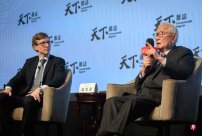A US Department of Commerce officials acknowledge that the United States has reached an agreement in Japan and the Netherlands to limit the advanced chip manufacturing equipment exported by China. This is the most direct comment published by US officials on the US -Japan -Dutch agreement so far.
According to Reuters, Don Graves, deputy minister of the United States, said on Tuesday (January 31) in a gap in Washington's event: "We can't talk about this agreement now, but we can be sureThe reason is that we negotiate with friends in Japan and the Netherlands. "
Bloomberg quoted those familiar with the matter on Friday (January 27) that Japan and the Netherlands could complete negotiations with the United States on the same day and formedThe powerful alliance restricts China to obtain advanced semiconductor manufacturing equipment, and teamed up to weaken the production capacity of China's construction chips.
Export control measures announced by the Bayeng government last October, including strictly restricting American manufacturers to provide the most advanced chip manufacturing equipment to Chinese customers, or buying from abroad to help improve their military and artificial intelligence capabilitiesSpeed chip.However, the main allies such as Rihe did not follow up at the time.
The US -Japan -Dutch agreement mainly expands the export control measures taken by the United States in October last year to the Netherlands and Japan, including ASML Holding NV, including the Dutch semiconductor equipment manufacturer,Nikon Corp, a large optical instrument manufacturer, and Tokyo Electron LTD (Tokyo Electron LTD).
However, for the details of the agreement reached by the three parties, the White House has always refused to comment. Washington wants to give Japan and the Netherlands space to decide how to convey these restrictions.Since the Dutch and Japan still have to finalize their final legal arrangements, the actual implementation plan may take months.
The US Department of Commerce responded to Reuters in an email that officials will continue to coordinate export control with the allies."We realize that multilateral control is more effective than unilateral control. Other countries participate in this control measure is a priority."


